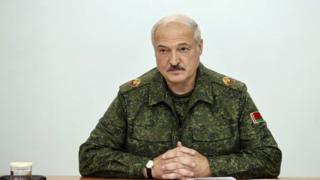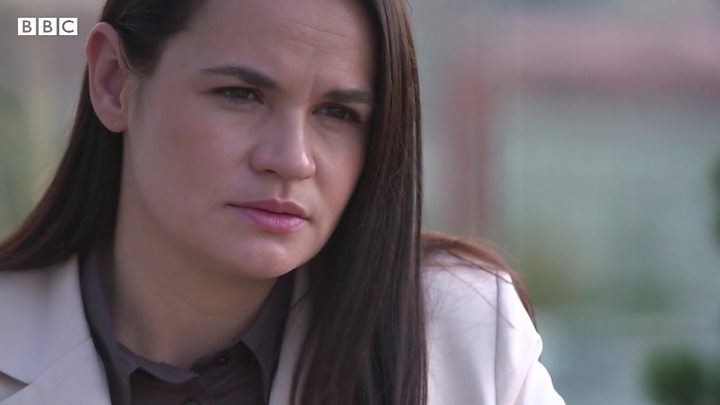
EPA
President Alexander Lukashenko told his officials to prepare forces on the border with Poland
Claims by Belarusian President Alexander Lukashenko that “foreign powers” are organising a build-up of troops on the country’s border are baseless, says Nato.
Dressed in military fatigues, the president said he had placed his armed forces on “high alert”.
Protests continued in the streets of Minsk on Saturday following a disputed election two weeks ago.
Demonstrators are demanding that Mr Lukashenko stand down.
The leader, who has ruled Belarus for 26 years, claimed the Nato bloc was trying to split up Belarus and install a new president in Minsk.
He said troops in Poland and Lithuania were readying themselves, and that he was moving his armed forces to the country’s western border.
“They are rocking the situation inside our country, trying to topple the authorities,” Mr Lukashenko said, adding that he ordered his security chiefs to “take the toughest measures to defend the territorial integrity of our country.”
Nato rejected the claim, saying it posed “no threat to Belarus or any other country and has no military build-up in the region. Our posture is strictly defensive.”
“The regime is trying to divert attention from Belarus’s internal problems at any cost with totally baseless statements about imaginary external threats,” Lithuanian President Gitanas Nauseda told AFP news agency.
A Polish presidency official called the suggestion that Poland planned any border destablisation “regime propaganda” by the Belarussians, which was “sad and surprising”. “Poland… has no such intention,” the official added.
Image copyright
Reuters
Protests against a brutal police crackdown continued in Minsk on Saturday
Nato urged Belarus to respect the fundamental human rights of its citizens.
Mr Lukashenko was re-elected president on 9 August but the vote was widely considered to be fraudulent. Protests disputing the result were met with a brutal crackdown that killed at least four people and demonstrators said they have been tortured in prisons and detention centres.
Belarus – the basic facts
Where is Belarus? It has Russia – its former imperial master – to the east and Ukraine to the south. To the north and west lie EU and Nato members Latvia, Lithuania and Poland.
Why does it matter? Like Ukraine, this nation of 9.5 million is caught in rivalry between the West and Russia. President Lukashenko, an ally of Russia, has been nicknamed “Europe’s last dictator”. He has been in power for 26 years, keeping much of the economy in state hands, and using censorship and police crackdowns against opponents.
What’s going on there? Now there is a huge opposition movement, demanding new, democratic leadership and economic reform. They say Mr Lukashenko rigged the 9 August election – officially he won by a landslide. His supporters say his toughness has kept the country stable.
The president has vowed to crush the unrest and has previously blamed the dissent on unnamed “foreign-backed revolutionaries”.
On Saturday crowds of protestors waved bright lights from mobile phones and flew Belarusian flags in the streets of Minsk while chanting “freedom”.
Police tried to disperse more than 1,000 people gathered in the city’s Independence Square, according to Interfax news agency.
A “solidarity” chain of hundreds of people, many wearing white, formed earlier in the day at the busy Komarovka shopping market.
It follows the country’s biggest protest in modern history last weekend when hundreds of thousands filled the streets.
Opposition leader Svetlana Tikhanovskaya, who was forced into exile the day after the election, vowed to “stand till the end” in the protests.

Media playback is unsupported on your device
She told the BBC that if the movement stopped now, they would be “slaves.” “We have no right to step back now,” she said.
Ms Tikhanovskaya told the BBC Belarusians had voted for her, not as a future president but as a “symbol of changes”.
“They were shouting for their future, for their wish to live in a free country, against violence, for their rights,” she said, in her only interview with a Western media outlet.